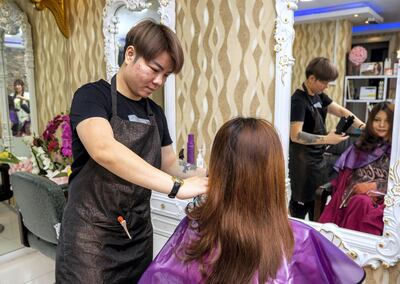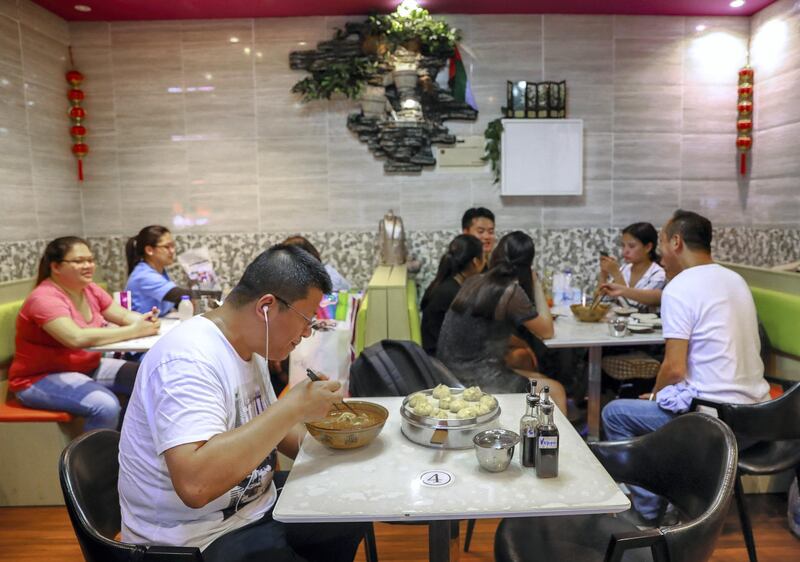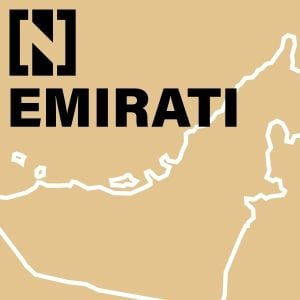They are the chefs in our best restaurants, the construction workers in our tallest towers and some of the brightest students in our universities: meet the Chinese expatriate community, a diverse and fascinating range of people living in the UAE today.
Estimated at 200,000 strong, the community make up the backbone of the country's economy and have seemingly created a microcosm of their homeland in the UAE.
Whether it is a place to eat, get an authentic Chinese massage or a friend to go shopping with, the Chinese residents of Abu Dhabi always manage to find something to remind them of home.
The all-Chinese staff at Angel Colour Beauty Centre in downtown Abu Dhabi hardly feel nostalgic at work and always manage to make a friend or two from the increasing Chinese clientele who flock there.
Likewise, the customers appreciate finding services they long for without having to travel more than seven hours by plane for.
Quang Weiwei, who has been living in the capital for 20 years, walked in with her sister to get cupping therapy for her back.
“I used to do it in China but in the therapy rooms there the air conditioning is too strong and I started to get back pain,” says the housewife, 42.
“Then a friend told me about this place, and since two years I’ve been coming every month.
“I meet Chinese people here like today my sister said ‘I’ll come with you’ just to socialise.”

The salon’s masseuse, Min Shao, says she has made many friends since moving to the UAE to boost her career.
“All the people here understand that Chinese massage and facial are special and I thought it would be popular here so I moved one year ago.”
She found a strong market for it not only within Chinese women, but among Emiratis and Filipinas alike.
The customers not only proved loyal for her work but they soon became friends.
“We go shopping together, or I go to parties at their homes on my day off,” she says.
Yezi Zhang has only been in the UAE for three months and, while she has made many Chinese friends at the accommodation her employers provide in Tourist Club, she says she dealt with two major culture shocks.
“I came because Dubai is very famous in China and I heard from people that they are coming so I came to see everything,” she says.
“The Chinese people coming here said there is too much gold it can be found on the ground everywhere. I came and saw nothing; no gold on the ground!”
Nonetheless, she says she was happy to find “everything so clean, and the people are very polite.”
______________
Read more:
President Xi Jinping pays homage to 'trail-blazing spirit' of China and UAE ahead of state visit
Class of cultures: Meet the Mandarin pupils bringing the language of the world to the UAE
The Great Wall and the Great Hall: Sheikh Zayed's landmark 1990 visit to China
______________
Her second shock, was “seeing women fully covered in this hot weather. Now I have to wear jeans even in summer,” the hairdresser, 30, says.
“We’ve been here for a long time we are used to wear long clothes,” says Dan Zhang, owner of the salon.
She arrived to the UAE nine years ago with her husband. They opened the salon to provide authentic Chinese services. She recruits all of her staff through word of mouth from her community back home or through visiting customers. “We have 450 people on our Wii chat group,” she says.
She says women from countries other than China are also attracted to the Salon because the prices are reasonable and they use Chinese tools for their facials. The tools are two jade spoon shaped spatulas used to spread the mask, lighten the skin and open pores.
Following the success of the salon, Ms Dan and her husband opened the first restaurant to offer handmade noodles to Abu Dhabi just over a year ago.
The small restaurant, named Dragon Bao Bao, is buzzing with employees on their lunch break on any given day.
Joth, a sales executive from east China, brings her colleagues from Egypt and the Philippines with her to the restaurant regularly.
“We always go to Chinese restaurant and wherever there is nice food. This one opened recently so I brought all my colleagues,” the 45-year-old says.
“I have many friends here and the owners are from my hometown so it is like the food I eat at home. It is special to find fresh handmade noodles. Some restaurants just buy it from the supermarket.”
Qingping Xing, a landscaper who has been in the UAE for 16 years, says he was relieved to find a place to eat fresh, hand-pulled noodles at in Abu Dhabi as he previously had to drive to Dubai for it.
“I heard about the place from my friends because there aren’t any others that make these noodles in Abu Dhabi and the main food for Chinese is noodles so we love to eat it,” he says.

The Chinese community in the capital are also comprised of students. NYU Abu Dhabi has also proven to be a lucrative choice for Chinese students to learn more about the Middle East.
“When I picked the university I was very young, and decided to go abroad and experience foreign life,” says Wendi Li, who is studying computer science.
“My plan was America but found out about NYUAD in Abu Dhabi. I didn’t know much about the Middle East and thought ‘why don’t I attend this university and see what’s happening in this part of the world’” says the 21-year-old from Dongying.
“It turned out to be a great decision because I would never have had the chance to explore this part of the world, to understand as much as I do know.
“I’m amazed by the students, the people around me and the culture which feels very different. Life is slow here compared to the large cities in China where the pace is very hard. Here you feel very relaxed and people tend to enjoy their life more,” he says.
Nonetheless, he says people seem more active than back home.
“The landscapes are not as diverse as China but people still go out for hiking, picnics more than people do in China. You feel different cultures – the local culture, European, Indian and different small communities.”
Ke Shi, 23, an economics and maths student from Nanjing, an area near Shanghai, says he was drawn to NYUAD “to see what world is like".
“You can meet people from all kinds of countries and religious backgrounds. It’s been very eye-opening.
“Nanjing atmosphere and culture is unique and homogenous where here it is cosmopolitan and you get exposure to a wide range of experiences. Thinking about working here but open to other options,” he says.
He sees the president’s visit as an opportunity to expose the UAE further to the people of China.
“In China they only hear about big countries and rarely does the UAE pop out but when Xi comes here, my high school friend’s bring it up and notice the UAE so that’s exciting and I look forward to that.”






